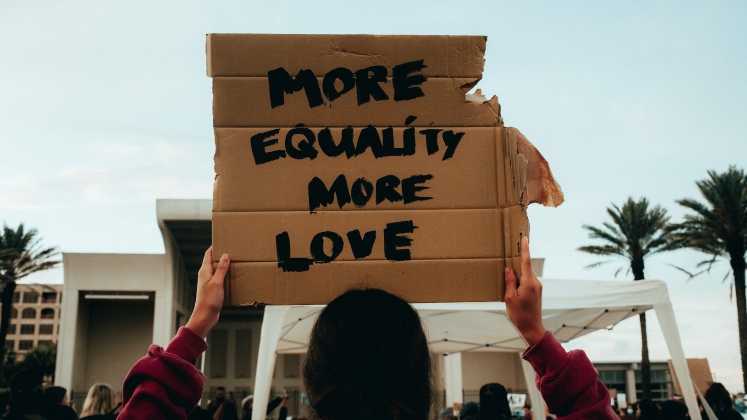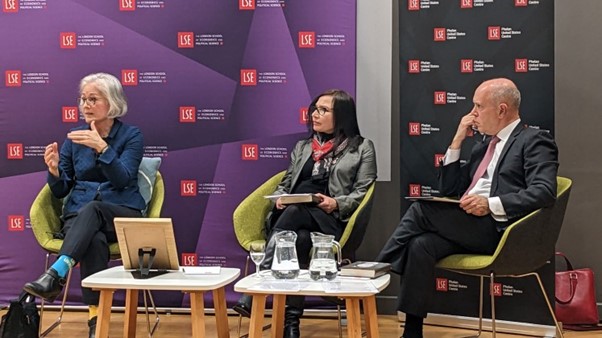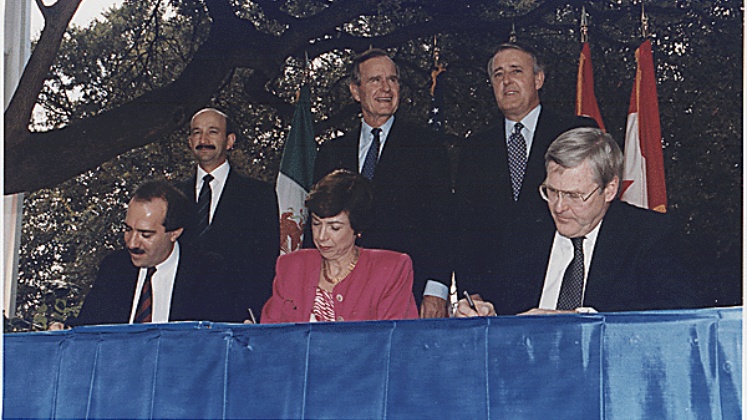 On Tuesday 4 October, the Phelan US Centre hosted the online public event ‘What is the Future of the US Supreme Court?’. Olivia Otts reviews the core arguments from each of the speakers and topics covered in the event’s Q&A segment.
On Tuesday 4 October, the Phelan US Centre hosted the online public event ‘What is the Future of the US Supreme Court?’. Olivia Otts reviews the core arguments from each of the speakers and topics covered in the event’s Q&A segment.
In the aftermath of recent divisive US Supreme Court decisions such as Dobbs v. Jackson, which ended the right to an abortion under the Constitution, on 4 October a panel chaired by Phelan US Centre Director, Professor Peter Trubowitz, brought together leading experts on US history and politics, Professor Emily Jackson, Professor of Law at LSE, Professor Theda Skocpol, Victor S. Thomas Professor of Government and Sociology at Harvard University; and Professor Jeffrey K Tulis, Professor of Government & Professor of Law at The University of Texas at Austin, to analyze what recent rulings mean for the future of American democracy. Professor Trubowitz, highlighting historic lows of public confidence in the Court, noted that long-standing precedents are at risk in the Court’s upcoming term.
Professor Skocpol, who was recently interviewed by The Atlantic on the Supreme Court’s ‘outsized role’, noted that that the US was always ‘a federated system in which direct democracy was minimal’, built on minority leverage for smaller states. Popular ethnonationalism, ‘nationalised by Donald Trump’, seeks to maximise minority rule through threats and violence to suppress Democrats’ potential electoral victories. McConnellism (after Republican Senate leader, Mitch McConnell), a series of ‘highly ideological’ wealthy interests, ‘dallies with ethnonational and Christian right’ views of restoring traditional family norms. This, she argues, is used to amass power to win elections, hobbling aspirations of passing policies supported by a majority of the electorate. She notes that the Court’s 6-3 majority is likely to remain confident in their ‘politically restrictionist objectives”. In reference to Trump himself, she expects that the Court will “clip (his) wings”, but not let him off the hook.
Professor Jackson, who contributed to a European law professors’ amicus brief to the Supreme Court on the legal and ethical implications of the Dobbs case, brought a critical view of the Court’s misinterpretations and ‘bizarre’ use of precedent in the judgements for overturning Roe v. Wade. Although the US Supreme Court had in the past drawn upon rights jurisprudence from other jurisdictions including the European Court of Human Rights, this judgement was insular, ‘untouched by any reference to international human rights obligations.’ She argues that originalism, a way of interpreting the Constitution as it would have been at the time it was written that right-wing justices lean heavily on, has become ‘incredibly value-laden’ and ‘the opposite of judicial restraint’. Concluding, she argued that the Dobbs decision puts the US ‘potentially in breach of multiple international obligations to protect the rights and health of women and girls.’
Professor Tulis, who has written extensively on American political development, argued that the public’s reaction to these decisions is ‘a healthy sign in an otherwise very unhealthy democracy’. He argues that the Court’s ‘normative illegitimacy problem’ is rooted in three factors. Bad faith confirmations occur when candidates deceive or lie to the US Senate about their views in their confirmation sessions. The ‘rhetorical judiciary’ arises when justices speak on cases outside of their formal opinions. Third, the Court’s partisanship also manifests, ‘in lockstep with the GOP’, the predictability of their decision-making along partisan lines. Court packing, in his view, may be the most viable option ‘to avoid entrenching a 6-3 majority for generations’. Tulis argues there is ‘historical precedent for Congress’s involvement’ in Supreme Court placements, and that if ‘Americans were brought to understand this, it would be possible to reshape the court’.
In the Q&A session, Michael Harvey of the Open University asked what is most likely to bring about a reduction of partisan politics within the next decade. Tulis noted that ‘waking people up to the severity of the situation’ is essential to get them to the polls, and Jackson presented optimism at the number of women in the US who are appalled by the Dobbs decision. Skocpol concluded by arguing that ‘the temperature has to be high on the side of those who want to defend American democracy’, in order to galvanize change at the polls.
The event’s Q&A also covered reasonings for the Dobbs judgement leak in May, theories of the Federalist Society’s influence over law careers, and consequences for Trump’s appointed Supreme Court judges if he’s indicted and found guilty.
- Header image: Photo by Claire Anderson on Unsplash
- Watch the video recording of the event [YouTube]
- Listen to a podcast of the event [LSE Player]
- Note: This article gives the views of the author, and not the position of USAPP – American Politics and Policy, nor the London School of Economics.
- Shortened URL for this post: https://bit.ly/3Sk9Afs






